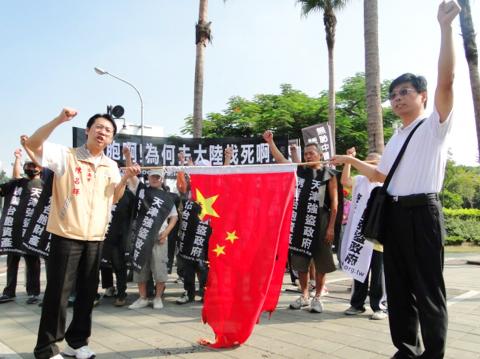|
Protests by ¡¥victims¡¦ of investment
in China grow
By Su Yung-yao / staff Reporter

Shen Po-sheng, leader of the
¡§Victims of Investment in China¡¨ group, right, and Taiwan Solidarity Union
member Chen Chang-hui, burn the flag of the People¡¦s Republic of China during a
protest in Greater Tainan on Sept. 26 last year.
Photo: Huang Po-lang, Taipei Times
As President Ma Ying-jeou (°¨^¤E) and his
government promote ever-closer business and trade relations between Taiwan and
China, a group of people who lost out on their investments in China have come
together to raise awareness of their predicament and call for change.
These ¡§Victims of Investment in China,¡¨ as they call themselves, have organized
a series of protest marches and motorcades in Taipei and other places, and
regularly gather next to Taipei Railway Station to tell people about their
unfortunate experiences on the other side of the Taiwan Strait.
The group has so far held eight protest demonstrations in the nation¡¦s five
biggest cities, starting with one in Taipei on Sept. 9.
According to the main organizer, Shen Po-sheng (¨H¬f³Ó), a self--described China
investment victim, the group is waiting until the Lunar New Year holiday is over
before it stages its ninth parade. Shen said that the group¡¦s demonstrations are
growing in size and influence, so it will continue to hold them.
They have gathered at Taipei Railway Station every day since Dec. 12, Shen said.
Participants carry flags and banners, wear jackets emblazoned with protest
slogans and frequently burn the Chinese flag.
Shen said that they must have burned between 20 and 30 Chinese flags so far.
Each protester has a bitter tale to tell. While many have lost all the money
they invested, families have also been ruined, while others have lost their
lives.
The protests are a very effective way of getting the message out and people who
have invested and lost their money in China turn up and join in on a regular
basis, Shen said
Sometimes Taiwanese or Chinese come forward to say that they have high-up
connections in China and could help the group take legal action, he added.
However, some of these people have an agenda that has something to do with
China¡¦s ¡§united front¡¨ policy, so their motives might be somewhat dubious, Shen
said.
Every day, people who speak with a variety of Chinese accents come and take
photographs, but this does not worry the protesters because the whole point of
what they are doing is to get the message about the Chinese authorities¡¦
wrongdoings through to as many people as possible, he said.
Seeking to reach an international audience, the group has posted a page in
English on their Web site.
The protests have attracted the attention of overseas media. The Washington Post
and Tokyo Web are among those who have sent reporters to interview them, Shen
said.
The protesters will take a few days off over the Lunar New Year break to relax
and celebrate with their families, but will be back to their daily schedule on
Thursday.
Having been re-elected in the Jan. 14 presidential election, Ma has said he will
continue to push for a cross-strait investment protection agreement to be
signed, but Shen is not optimistic about what such an agreement can achieve.
A formal agreement might sound like a useful and sensible measure, but in Shen¡¦s
view, the problem is that the Chinese authorities will never implement it
properly.
He said that many of the victims he knows have been robbed by local government
officials in China, so he holds out little hope for the success of
investigations carried out by other Chinese officials into the activities of
their fellow bureaucrats.
Through their regular demonstrations and gatherings, the group is gradually
gaining in strength.
Shen tells the story of a Taiwanese businessman who he had never met before who
telephoned him from Kaohsiung and told him about his case in Fujian Province.
The businessman said that the authorities had originally planned to pay him 1
million yuan (US$158,228) in compensation, but then agreed to increase that to 3
million yuan. They said that it had come to their attention that some Taiwanese
investors were ¡§making a fuss¡¨ over investment losses.
If nothing else, at least the protests have had a positive effect in this
particular case, Shen said.
|
![]()
![]()
![]()